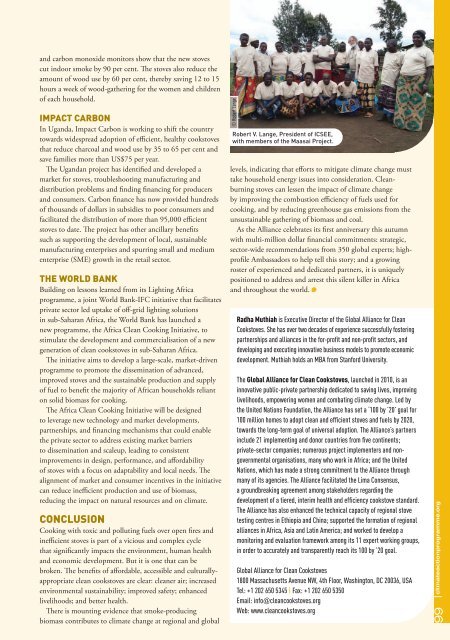Climate Action 2011-2012
Create successful ePaper yourself
Turn your PDF publications into a flip-book with our unique Google optimized e-Paper software.
and carbon monoxide monitors show that the new stoves<br />
cut indoor smoke by 90 per cent. The stoves also reduce the<br />
amount of wood use by 60 per cent, thereby saving 12 to 15<br />
hours a week of wood-gathering for the women and children<br />
of each household.<br />
impact carbon<br />
In Uganda, Impact Carbon is working to shift the country<br />
towards widespread adoption of efficient, healthy cookstoves<br />
that reduce charcoal and wood use by 35 to 65 per cent and<br />
save families more than US$75 per year.<br />
The Ugandan project has identified and developed a<br />
market for stoves, troubleshooting manufacturing and<br />
distribution problems and finding financing for producers<br />
and consumers. Carbon finance has now provided hundreds<br />
of thousands of dollars in subsidies to poor consumers and<br />
facilitated the distribution of more than 95,000 efficient<br />
stoves to date. The project has other ancillary benefits<br />
such as supporting the development of local, sustainable<br />
manufacturing enterprises and spurring small and medium<br />
enterprise (SME) growth in the retail sector.<br />
tHe World bank<br />
Building on lessons learned from its Lighting Africa<br />
programme, a joint World Bank-IFC initiative that facilitates<br />
private sector led uptake of off-grid lighting solutions<br />
in sub-Saharan Africa, the World Bank has launched a<br />
new programme, the Africa Clean Cooking Initiative, to<br />
stimulate the development and commercialisation of a new<br />
generation of clean cookstoves in sub-Saharan Africa.<br />
The initiative aims to develop a large-scale, market-driven<br />
programme to promote the dissemination of advanced,<br />
improved stoves and the sustainable production and supply<br />
of fuel to benefit the majority of African households reliant<br />
on solid biomass for cooking.<br />
The Africa Clean Cooking Initiative will be designed<br />
to leverage new technology and market developments,<br />
partnerships, and financing mechanisms that could enable<br />
the private sector to address existing market barriers<br />
to dissemination and scaleup, leading to consistent<br />
improvements in design, performance, and affordability<br />
of stoves with a focus on adaptability and local needs. The<br />
alignment of market and consumer incentives in the initiative<br />
can reduce inefficient production and use of biomass,<br />
reducing the impact on natural resources and on climate.<br />
conclusion<br />
Cooking with toxic and polluting fuels over open fires and<br />
inefficient stoves is part of a vicious and complex cycle<br />
that significantly impacts the environment, human health<br />
and economic development. But it is one that can be<br />
broken. The benefits of affordable, accessible and culturallyappropriate<br />
clean cookstoves are clear: cleaner air; increased<br />
environmental sustainability; improved safety; enhanced<br />
livelihoods; and better health.<br />
There is mounting evidence that smoke-producing<br />
biomass contributes to climate change at regional and global<br />
© Robert Lange<br />
Robert V. Lange, President of ICSEE,<br />
with members of the Maasai Project.<br />
levels, indicating that efforts to mitigate climate change must<br />
take household energy issues into consideration. Cleanburning<br />
stoves can lessen the impact of climate change<br />
by improving the combustion efficiency of fuels used for<br />
cooking, and by reducing greenhouse gas emissions from the<br />
unsustainable gathering of biomass and coal.<br />
As the Alliance celebrates its first anniversary this autumn<br />
with multi-million dollar financial commitments: strategic,<br />
sector-wide recommendations from 350 global experts; highprofile<br />
Ambassadors to help tell this story; and a growing<br />
roster of experienced and dedicated partners, it is uniquely<br />
positioned to address and arrest this silent killer in Africa<br />
and throughout the world.<br />
Radha Muthiah is Executive Director of the Global Alliance for Clean<br />
Cookstoves. She has over two decades of experience successfully fostering<br />
partnerships and alliances in the for-profit and non-profit sectors, and<br />
developing and executing innovative business models to promote economic<br />
development. Muthiah holds an MBA from Stanford University.<br />
The Global Alliance for Clean Cookstoves, launched in 2010, is an<br />
innovative public-private partnership dedicated to saving lives, improving<br />
livelihoods, empowering women and combating climate change. Led by<br />
the United Nations Foundation, the Alliance has set a ‘100 by ’20’ goal for<br />
100 million homes to adopt clean and efficient stoves and fuels by 2020,<br />
towards the long-term goal of universal adoption. The Alliance’s partners<br />
include 21 implementing and donor countries from five continents;<br />
private-sector companies; numerous project implementers and nongovernmental<br />
organisations, many who work in Africa; and the United<br />
Nations, which has made a strong commitment to the Alliance through<br />
many of its agencies. The Alliance facilitated the Lima Consensus,<br />
a groundbreaking agreement among stakeholders regarding the<br />
development of a tiered, interim health and efficiency cookstove standard.<br />
The Alliance has also enhanced the technical capacity of regional stove<br />
testing centres in Ethiopia and China; supported the formation of regional<br />
alliances in Africa, Asia and Latin America; and worked to develop a<br />
monitoring and evaluation framework among its 11 expert working groups,<br />
in order to accurately and transparently reach its 100 by ’20 goal.<br />
Global Alliance for Clean Cookstoves<br />
1800 Massachusetts Avenue NW, 4th Floor, Washington, DC 20036, USA<br />
Tel: +1 202 650 5345 | Fax: +1 202 650 5350<br />
Email: info@cleancookstoves.org<br />
Web: www.cleancookstoves.org<br />
99 climateactionprogramme.org












